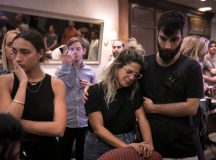Following 7 October the Greens were the only Australian political party that refused to support a federal parliamentary motion condemning the Hamas massacre. It is time for the Greens to reclaim their stated universalistic beliefs in favour of equality and justice for all, including Jews, argues Philip Mendes.
The Australian Greens are Australia’s leading progressive parliamentary political party, holding 11 seats in the federal Upper House, and four seats in the federal Lower House. They are the champions of the welfare state, supporting a liveable income for disadvantaged Australians reliant on social security payments, and opposing punitive compliance measures such as compulsory income management. They also endorse progressive harm reduction policies on illicit drugs such as medically supervised injecting centres, and advocate enhanced supports for young people who have grown up (mostly as a result of childhood adversity) in forms of out-of-home care.
But when it comes to Israel, the Greens seem to leave their universalistic humanitarian politics behind. As with a number of other progressive Australian groups and individuals, they responded to the October 7 Hamas death squad massacre not by championing solidarity with the traumatised Australian Jewish community, but rather by aligning themselves with ultra-nationalist Palestinian agendas antipathetic to any forms of peacefully negotiated conflict resolution. The Greens seem to be an exemplar of what I have previously termed Progressive except for Jews (PEJs).
Since their formation in 1992, the Greens have always espoused a broad pro-Palestinian position. But the Party has still incorporated a diversity of views and alignments. On the one hand, the New South Wales (NSW) Branch of the Greens has been the most strident pro-Palestinian faction, long supporting the extremist Boycott, Divestment and Sanctions (BDS) movement. Indeed, it was the Greens-controlled Marrickville Council in NSW which attracted international attention and opprobrium for its 2010 motion proposing a boycott of Israel.
In contrast, the national Greens have officially supported a two-state solution, and rejected BDS proposals. In November 2020, Greens leader Adam Bandt contested ‘the furphy that the Greens do not support Israel’, and insisted that ‘the people of Israel have a right to live in peace and security. That means an independent state that allows its people to flourish’. During the 2022 federal election campaign, the Greens responded to an Executive Council of Australian Jewry questionnaire by stating they supported a two-state solution incorporating peace and security for both Israel and Palestine, and opposed the BDS movement.
But as I noted in a 2015 book chapter, although the official Greens policy endorses the national rights of both Israelis and Palestinians, the party rhetoric presents a strong pro-Palestinian bias. Party statements often condemn actions of the Israeli government without recognising any distinction between the views of the state and the people. In contrast, the Greens are careful not to conflate the opinions of Hamas with the Palestinian people per se, and indeed offer a firm solidarity to all Palestinians irrespective of political or ideological perspectives. The Greens have rarely if ever engaged with Israeli progressives and peace advocates, but conversely they regularly approve the views of Palestinian nationalist activists locally and globally, irrespective of whether they are progressive-leaning or alternatively ethnocentric conservatives.
In June 2023, the Greens released a new policy on Palestine and Israel which seemed to dump their in-principle support for two states. The policy presented a completely one-sided attack on Israeli policies towards the Palestinians, and additionally endorsed the BDS movement, and demanded implementation of the so-called right of return of 1948 Palestinian refugees which would almost certainly result in the elimination of the State of Israel.
As noted by a prominent Jewish Left online publication, the updated policy seemed to abandon any display of support for ‘Israel’s right to peace, security or statehood’.
Following the 7 October massacre, the Greens were the only Australian political party that refused to support an October 18 federal parliamentary motion condemning the Hamas massacre and endorsing Israel’s right to self-defence. Instead, the Greens unsuccessfully proposed an alternative motion that eschewed any solidarity with Israel, and instead condemned Israeli war crimes, and demanded an end to the Israeli occupation of Palestinian Territories. Three weeks later, the entire Greens Upper House caucus walked out of the national parliament on Monday 6 November in protest at the Labor government’s general pro-Israel stance, chanting the inflammatory nationalist slogan, ‘Free, free Palestine’.
Overall, the Greens response to October 7 was characterised by the following components:
An insipid criticism of Hamas which failed to denounce their long history of extreme racist actions towards Jews.
The Greens have issued some general criticisms of the Hamas massacre, using in one case words such as ‘brutal’ and ‘callous’ to censor Hamas actions.
But they have failed to present a broader ideological repudiation of Hamas. For example, they did not identify Hamas as an Islamo-fascist group; did not communicate that Hamas is inspired by two strands of eliminationist antisemitism, one being Nazi-style racial antisemitism as reflected in its 1988 founding constitution, the other being religious-based antisemitism via its origins within the extremist Muslim Brotherhood; did not advise that both these currents eschew any compromise with the Israeli Jewish people, and rather seek to destroy the State of Israel by genocidal violence and replace it with an exclusivist Arab-Muslim state of Greater Palestine; and omitted to acknowledge that since the early 1990s, Hamas has been responsible for dozens of attacks on civilians within Israel including suicide bombings, rocket attacks, and the latest massacre. Additionally, the Greens erroneously implied that Hamas was not connected to mainstream Palestinian nationalism despite the fact that a majority of Palestinians democratically voted for Hamas in the election held in 2005.
Nor did most of the Greens statements delineate the full horror of the Hamas massacre such as the rapes and torture, the burning of bodies, the slaughter of whole families, and the taking of hundreds of hostages.
The sole exception to this soft Greens rejection of Hamas was a statement issued online in November 2023 which unequivocally stated: ‘There is no excuse, no justification and no celebration that can be found in attacks that deliberately targeted and sought to traumatise civilian communities. That was not an act of resistance, nor a legitimate military offensive. This was a terrorist act and we will continue to condemn it as such’. The statement additionally expressed ‘compassion and solidarity with all members of the Australian Jewish community and all those impacted’.
However, this meritorious statement seems to have been an outlier, and neither the detailed condemnation of Hamas nor the advocacy of solidarity with traumatised Australian Jews were repeated in any parliamentary statements.
A proliferation of Greens speakers at public pro-Palestinian rallies which used inflammatory ultra-nationalist terms such as ‘Free Palestine’ and ‘From the river to the sea, Palestine will be free’
For example, Samathan Ratnam, the leader of the Greens group in the Victorian state parliament, addressed a pro-Palestine rally held in Melbourne on 12 November. Similarly, Federal Senators Mehreen Faruqi and David Shoebridge addressed pro-Palestinian rallies held in Melbourne and Sydney respectively on 19 November, and Victorian Greens state parliamentarian Gabrielle de Vietri addressed a rally on 26 November. And another Federal Greens Senator Penny Allman-Payne enthusiastically endorsed a School Strike for Palestine rally held on 23 November at which inflammatory slogans such as ‘From the river to the sea…’ were widely chanted. Additionally, Greens members of many local councils have regularly initiated or supported one-sided pro-Palestinian motions.
Persistent rhetoric that referred to 75 years of occupation or the Nakba of 1948 implying that the Greens rejected the existence of Green Line Israel
For example, Greens Senator (and long-standing BDS supporter) David Shoebridge referred to ‘the first aggression from Israel 75 years ago’ which implied that the Jewish state has no right to exist, and emphasised his ‘solidarity with the families in Gaza’, but made no reference to the Israeli families murdered by Hamas. Similarly, the Greens member for Newtown in the New South Wales state parliament, Jenny Leong, referred to 75 years of Israeli war against the Palestinians.
As noted further below, federal Senator Mereen Faruqi has persistently censored Israeli actions from 1948, not just the post-1967 occupation of the West Bank and Gaza Strip.
Frequent statements of solidarity with Palestinians, but almost no similar statements of solidarity or even engagement with traumatised Australian Jews
In a November 2021 statement, the Greens demonstrated they were not seriously interested in tackling anti-Semitism. Firstly, they framed anti-Semitism as being solely a product of far Right politics, and ignored major contemporary progressive and Islamist sources of anti-Jewish racism. Secondly, they rejected endorsement of the International Holocaust Remembrance Alliance (IHRA) working definition of antisemitism which has been widely adopted and/or endorsed internationally by national governments (38) including most European Union member states, universities (314), the Organisation for Security and Cooperation in Europe, and other key bodies internationally. The Greens rejection of the IHRA definition suggested that combatting anti-Semitism and allying with its victims was a very low policy priority.
Following the 7 October massacre, the Greens displayed little or no interest in engaging with the lived experience of Australian Jews who had been traumatised by both the Hamas massacre and local demonstrations of support for Hamas. In contrast, the Greens Foreign Affairs Spokesperson, Senator Steele-John, specifically emphasised their ‘solidarity with the Australian Palestinian community’. So did Greens Senator David Shoebridge, who highlighted their ‘solidarity with the Palestinian diaspora in this country’, and similarly, Greens Senator Janet Rice trumpeted her ‘solidarity with the Palestinian people’.
Statements in favour of peace, but lacking any balanced plans or strategies for achieving the compromises required from both sides for conflict resolution
For example, the Greens simplistically argue that ‘for peace to be lasting, the Israeli government needs to end the occupation’. But this one-sided statement fails to present any strategies to address major Palestinian and Arab barriers to peace. Most notably, no Greens statements include any recommendations to disarm Hamas, or prevent further Hamas massacres of Israeli civilian populations. Nor do they precisely define what they mean by ‘the occupation’ which is concerning given that some of their statements imply that the internationally recognised Green Line borders of Israel also constitute ‘occupied’ Palestinian territory.
The Case of Green Senator Mehreen Saeed Faruqi
The worst offender has arguably been the Greens Deputy Leader, Senator Faruqi, who has been an elected member of the national parliament since August 2018. Born in Pakistan in 1963 before migrating to Australia in 1992, Faruqi complains in her autobiography that her credentials as a self-described ‘secular progressive feminist’ are not respected because of her Muslim background. Yet, she insists that she holds social justice values in favour of marriage equality, religious and racial tolerance, legal abortion, liberalisation of illicit drug laws, and against gender-based sexual violence:.
Yet, it is arguable that her professed anti-racist and feminist opinions do not extend to Jews.
In January 2022, Faruqi expressed strong support for the BDS movement campaign to boycott the Sydney Festival due to its acceptance of Israeli Embassy sponsorship of a dance performance. She has also vigorously opposed adoption of the IHRA working definition of Antisemitism, implying that it may unfairly limit aggressive criticisms of Israel, but without presenting any alternative strategies or framework for combatting anti-Semitism.
Despite Faruqi’s stated passion in her autobiography for opposing patriarchy and sexual violence, she does not seem to have issued one word of criticism regarding Hamas’s mass rape of Israeli women. To the contrary, in October 2023, she presented two speeches which implicitly contested Israel’s right to exist. In the first speech, she condemned what she termed ‘75 years of Israeli oppression’, and suggested that Israel was planning another Nakba. She rejected any Israeli right to self-defence, and ambiguously demanded an end to ‘Israel’s illegal occupation’ which could have meant either 1948 or 1967.
In a further speech on 18 October, she again referred to ‘brutal Israeli oppression for 75 years’, and demanded an ‘end to Israel’s illegal occupation and oppression’ which could be interpreted as a call for Israel’s destruction.
In November 2023, Faruqi was photographed at a School Strike for Palestine rally in Sydney (at which she had been an official speaker) alongside a group of young females holding an overtly anti-Semitic sign depicting an Israeli flag being thrown in a bin to supposedly keep the world clean. This was almost identical to the anti-Jewish sign that provoked worldwide condemnation after it was carried by a Norwegian protester at an earlier pro-Palestinian rally in Warsaw.
Following public concerns, the Senator deleted the photo from her Instagram page, and apologised to anybody offended. But a Jewish Greens spokesperson Daniel Coleman criticised the Senator for failing to use this incident as an opportunity to educate pro-Palestinian groups about the means by which anti-Zionism could easily degenerate into overt anti-Jewish racism. According to Coleman, she should have ‘explained why the poster, for many, implies the extermination of millions of Jews… Without that explanation, she steps onto the slippery slope that leads from anti-antisemitic, to not anti-Semitic, to actually antisemitic’.
Alternative progressive directions
If the Australian Greens wanted to identify a more balanced Greens perspective that genuinely aimed to advance the national rights of both the Israeli and Palestinian peoples, they would not have to look beyond their German colleagues. In November 2023, the German Vice-Chancellor (and Greens member) Robert Habeck provided an exemplar of a genuinely universalistic progressive approach to the conflict.
Habeck highlighted that defending the security of Israel was an historical responsibility of Germany, as was protecting the right of Jews in Germany to live freely and safely. He attacked antisemitism emanating from sections of the Left, and condemned Hamas as a ‘murderous terrorist group fighting for the annihilation of the State of Israel and the death of all Jews’. He emphasised that ‘Israel’s right to exist must not be relativized. Israel’s security is our obligation’.
Additionally, the Greens Party of Canada provided a specific condemnation of the 7 October massacre, and a reasonably balanced condemnation of violence on both sides.
It is time for the Australian Greens to follow such progressive examples, and reclaim their stated universalistic beliefs in favour of equality and justice for all including Jews. Otherwise, in the words of the British commentator Philip Spencer, ‘it is not universalist at all but antisemitic’.



































